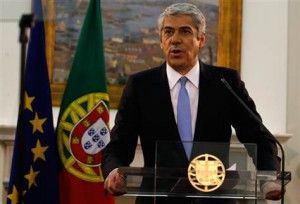Portugal May Need $99 Billion Bailout
A bailout for Portugal may total as much as 70 billion euros ($99 billion), said two European officials with direct knowledge of the matter.
A financial lifeline would be between 50 billion euros and 70 billion euros, said the officials who declined to be named because the issue is confidential. Portugal has not yet asked for a bailout. The figures remain preliminary, the officials said. Royal Bank of Scotland Group Plc estimates the cost of a rescue at about 80 billion euros.
Portugal moved closer to external aid after Prime Minister Jose Socrates’s offer to resign left his government in limbo on the eve of today’s European Union summit to address the region’s debt crisis. Two-year Portuguese bond yields reached the highest since 1999. The government retains its powers for now before President Anibal Cavaco Silva meets tomorrow with the main parties to resolve the political crisis or call elections.
German Chancellor Angela Merkel praised Socrates today for putting “far-reaching” austerity measures to parliament, which rejected the package last night. The vote prompted him to tender his resignation and moved the nation closer to following Greece and Ireland in requiring a bailout.
“It’s pretty inevitable” that Portugal will need a rescue, said Jacques Cailloux, a London-based economist at RBS. “The market will deteriorate in the absence of other measures going through. There is obviously the risk of further downgrades, which will become anticipated by the markets and be a self-fulfilling prophecy.”
The yield on Portuguese two-year notes jumped 19 basis points to 6.80 percent as of 10.57 a.m. in London, and reached 6.89 percent, the highest level since the euro’s inception. The cost of insuring Portuguese government debt jumped 17.5 basis points to 552, the highest since it closed at a record 555 basis points on Jan. 10, according to CMA.
Portugal has already raised taxes and implemented the deepest spending cuts in more than three decades to convince investors it can reduce its budget shortfall. Additional cuts, announced on March 11, prompted a political backlash and failed to persuade investors.


